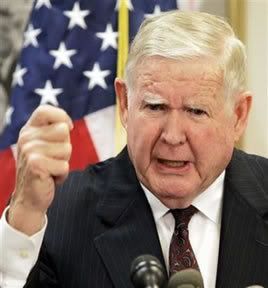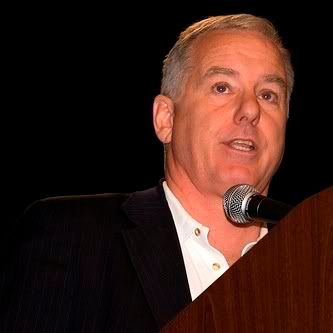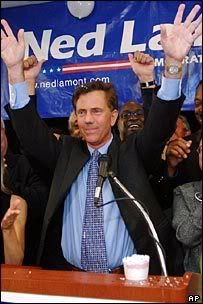(cross-posted at Daily Kos)

Many of us have met Time’s choice for Person of the Year – You – with some derision. If the criteria of the award were to be literally followed (“the individual or group of individuals who have had the biggest effect on the year’s news”), then it would always be the entire human population.
However, I thought it would be a good exercise to write about who the ‘Democrats of the Year’ were in 2006. The mainstream media, as evidenced by Time, would probably select Harry Reid, Nancy Pelosi, Chuck Schumer, and Rahm Emanuel – those most often credited for the electoral victories a month ago. Here are mine, complete with requisite title:
John Murtha, Howard Dean, and Ned Lamont
How a political insider, a political outsider, and a political nobody rocked the American political landscape.
John Murtha

Congressmen John Murtha wasn’t particularly well-known to the general public before the end of 2005. Elected to represent Pennsylvania’s 12th District in 1974 as one of the Watergate Babies, Murtha perhaps was best known until now as being investigated in relations to the Abscam scandal. But that all changed on November 17, 2005, when Murtha – arguably one of the more hawkish Democrats in the House and certainly not one of its more progressive members – came out with this surprisingly blunt assessment of the war in Iraq, a conflict he had once strongly supported:
“The U.S. cannot accomplish anything further in Iraq militarily. It is time to bring them home,” said Rep. John Murtha of Pennsylvania, a former Marine intelligence officer in Vietnam and the senior Democrat on the House appropriations subcommittee that oversees military spending.
“The war in Iraq is not going as advertised,” said Murtha, who in October 2002 voted for the resolution authorizing President Bush to take military action to oust Saddam Hussein. “It’s a flawed policy wrapped in illusion. The American public is way ahead of the members of Congress.”
[…]
“We cannot continue on the present course. It is evident that continued military action in Iraq is not in the best interest of the United States of America, the Iraqi people or the Persian Gulf region,” said Murtha…
Despite Murtha’s fairly conservative voting record as a Democrat, the White House didn’t hesitate to immediately paint Murtha in the same way it paints all enemies – as an extremist:
In a broadside issued Thursday night, Bush spokesman Scott McClellan said that it is “baffling that [Pennsylvania Rep. John Murtha] is endorsing the policy positions of Michael Moore and the extreme liberal wing of the Democratic party.”
[…]
White House Counselor Dan Bartlett called Murtha’s position “out of the mainstream of his own party,” and said that “immediate withdrawal would be, as one general on the ground put it, a recipe for disaster.”
Until then, the Republican Party had done a pretty good job of declaring anyone who disagreed with its national security policy anti-American or some other epithet, regardless of their actual political leanings. But any sort of attacks that the White House and its right-wing allies may have tried to ingrain into public sentiment ground to a halt just the next day, when the most junior member of the House, Jean Schmidt, publicly implied that Murtha was a coward:
A few minutes ago I received a call from Colonel Danny Bubp, Ohio Representative from the 88th district in the House of Representatives. He asked me to send Congress a message: Stay the course. He also asked me to send Congressman Murtha a message, that cowards cut and run, Marines never do.
Ever since the smear machine of the right wing went too far, Murtha has been virtually untouchable. Since then, Murtha has continued to be strong voice on withdrawing from Iraq as soon as possible. Despite an attempt to Swift Boat his record as a Marine, Murtha easily won re-election this past November with 61% of the vote. Although his position within the Democratic caucus may have been hurt slightly by his race for the position of House Majority Leader, which he ultimately lost to Rep. Steny Hoyer (D-MD), no one did more to single-handedly shift the debate on Iraq from one about whether or not we should leave to when we should leave. No matter how much the Bush administration tries to say that leaving is not an option, Iraq has become worse each and every day we stay there. The violence increases, more American troops are killed, and we cannot afford to stay there any longer. The latest polling on Iraq shows that 70% of Americans disapprove of Bush’s handling of the war, and a majority (54%) want the troops brought home within a year.
John Murtha is an unlikely choice to be a force for change in the Democratic Party. His dealings on the Appropriations Committee is the kind of insider wheeling-and-dealing that we need less of in Congress. But his change of heart on Iraq shook the political establishment and gave the party a clear direction on what we should do in Iraq. Making a clear distinction between the ‘stay-the-course’ position of the GOP and the call for change that Murtha initiated helped shift the terms of the debate on Iraq.
Howard Dean

(yKos photo hat tip to Majikthise)
When the high-flying presidential campaign of Howard Dean came crashing down in Iowa, the political establishment claimed that the former governor of Vermont was permanently damaged politically. He had campaigned as a loud and proud outsider, and his style endeared himself to grassroots activists who had long been ignored by the Democratic Party. Here is Kos’ take on Dean’s memorable speech to the California Democratic Party, way back on March 16, 2003:
He started by blasting Bush’s invasion, and the crowd was instantly hooked. It was electrifying. The whole convention center hushed, hanging on his every words (only Rep. Maxine Waters had a similar effect). Dean raised the rhetoric gradually, drawing louder applause each time. People were loving it. He uttered Wellstone’s line: “I’m here to represent the Democratic Wing of the Democratic Party”. People went wild. His speech was repeatedly interrupted by chants of “we want Dean!”.
But the most amazing part was the finale, with a fiery Dean pounding the podium:
I want my country back!
I don’t want to listen to fundamentalist preachers anymore!
When Dean uttered this last line, the whole place went nuts. Utter pandemonium. It was literally one of the most amazing sights I have ever seen.
When Dean decided to run for DNC chairman, there were many attempts to outflank him. Harry Reid and Nancy Pelosi supported former Rep. Tim Roemer (D-IN). Others, such as Martin Frost, Ron Kirk, and Donnie Fowler vied for the spot, but Dean ended up winning the voice vote unanimously, largely based on his promise to provide the Democratic Party at the state level with money to rebuild a decadent (and sometimes non-existent) grassroots organization. Perhaps not surprisingly in light of future developments to come, one of Dean’s biggest backers for the position was…John Murtha.
“I am not with him on all the issues, but he understands the party’s problems, what we need to do and how to get there,” said Murtha. “And he has executive experience…A lot of people in the party don’t understand just where we are. We need a change. We need something different.”
The cornerstone of Dean’s platform was the 50-State Strategy. The Democratic Party had fallen far behind the GOP in terms of organizing at the grassroots level throughout the nation, as we had become far too focused on ‘swing’ states and districts in elections instead of running competitively everywhere. The D.C. insiders who were used to having power in their hands, though, thought it was foolish:
BEGALA: No. I think Candy’s report was spot on.
[Dean] — yes, he’s in trouble, in that campaign managers, candidates, are really angry with him. He has raised $74 million and spent $64 million. He says it’s a long-term strategy. But what he has spent it on, apparently, is just hiring a bunch of staff people to wander around Utah and Mississippi and pick their nose. That’s not how you build a party. You win elections. That’s how you build a party.
Many of us thought that the 50-State Strategy would not show any results for several years, at the very least. Pundits such as Begala thought it was stupid. But in the 2006 elections, we won some seats in surprising places – whether it be in Kansas’ 2nd District, where Nancy Boyda scored an unlikely upset, or in California’s 11th District, where Jerry McNerney knocked off Richard Pombo after getting trounced in 2004. The media has already begun to rewrite the narrative, crediting outgoing DCCC chair Emanuel with expanding the field. But if Emanuel had his way, we wouldn’t have taken the House in 2006. Here’s the spot-on analysis from Down With Tyranny (emphasis added is mine):
Despite all the praise being heaped upon Rahm Emanuel for the Democratic Party takeover of the House of Representatives, his strategy was a failure. The simple fact is that Emanuel’s plan was to target 21 Republican seats as part of his Democratic Congressional Campaign Committee’s “Red to Blue” strategy, and as of right now, while Democrats needed to take 15 seats to regain control, only nine of those 21 DCCC picked seats have changed hands (three are still in contention). Most of these candidates were “hand-picked” by Emanuel, based on his perception of their prospects to win election—and most of them failed, often by significant margins– and at great financial cost.
Howard Dean’s presidential campaign was about bringing people back into the political process. As DNC chair, the 50-State Strategy has been a nationwide continuation of returning the Democratic Party to the people. He had to fight a lot of people in public and private – including the four Democrats (Reid, Pelosi, Schumer, and Emanuel) who are given the bulk of the credit for the electoral gains made this years. But it was Dean’s strategy of expanding the playing field everywhere that made 2006 an historic election. If you let people know that their voices will be heard, even the unexpected can happen.
Ned Lamont

At the beginning of 2006, none of us knew who Ned Lamont was. But we got an early heads-up that we would be hearing more about a Greenwich cable executive in the near future:
In the coming weeks and months, Ned will lay out his plan to use the grass-roots and the net-roots to dethrone Lieberman and then proceed to Washington to take back the power in this country from the huge corporations, special interests, big-money lobbyists and their obedient minions in Congress.
Stay tuned. And remember – you heard it here first.
There had been a deep and increasing unhappiness with Joe Lieberman festering in Connecticut over the years. His full-throated support of the Iraqi conflict – at times, he sounded (and still does sound) like more of a neoconservative than some Republicans – was the last straw, and his fate was sealed by a kiss after the 2005 State of the Union address. ctkeith started DumpJoe.com and handed out the legendary Kiss buttons. The local Connecticut blogging scene took the lead on chronicling the rise of Lamont and the slippery, sliding decline of Lieberman. Ordinary citizens such as Spazeboy, CT Blogger, CT Bob, and the activists at My Left Nutmeg, to name a few, elevated netroots activism to a higher level. From Lamont’s surprising showing at the nominating convention to his stunning primary victory to his eventual defeat in the general election, his campaign was about the people of Connecticut. The call to action that Dean issued resonated everywhere, and nowhere was that more evident than during the senatorial election in the Nutmeg State, where a former vice presidential nominee became a pariah within his own party despite his re-election.
Even though Lamont was not victorious in the general election, his triumph in the primary resulted largely from one issue: Iraq. Lieberman’s strong pro-war stance has been well-documented, and it came to be his biggest liability. His op-ed in the Wall Street Journal, entitled Our Troops Must Stay, illuminated his absolute cluelessness about the true situation in Iraq (despite having visited the country numerous times) and highlighted how out of touch he was with his Democratic base. Lamont, on the other hand, ran on a simple platform when it came to Iraq:
I salute the patriotism and wisdom of Congressman Murtha and others who emphasize that “stay the course” is not a winning strategy for Iraq or America. Our best chance of success requires that the Iraqis take control of their own destiny. America should make clear that we have no designs upon their oil and no plans for permanent bases. While we will continue to provide logistical and training support as long as we are asked, our frontline military troops should begin to be redeployed and our troops should start heading home.
No longer could the position of bringing the troops be called extremist – John Murtha provided ample cover from that claim. Even though Dick Cheney went as far as to say that Lamont’s victory in the primary helped al Qaeda types, the position resonated with the people who voted in the primary. The actualization of Lamont’s lead on August 8th, from leading in the polls to winning an election, rocked the boat (to borrow one of the Lamont campaign’s favorite phrases). No longer was supporting the war considered to be an asset to anyone so as to appear ‘strong’ on national security. Instead, it was a repudiation of foolhardy cheerleading of a conflict that had gone on too long in the wrong direction. In the general election in November, Republicans – particularly moderates – suffered because the GOP became associated with the increasingly unpopular war in Iraq. Patrick Murphy won the election in Pennsylvania’s 8th District over his opponent largely because of his strong stance on getting out of Iraq – and his Republican opponent’s inability to define an equally clear position. Lamont may have been deemed an extremist by the media, but his stance on Iraq, validated by the primary victory in August, accelerated the debate as to when we should leave Iraq.
Ned Lamont won’t be sworn in on January 4 as the junior senator of Connecticut. But his campaign, defined by the position that John Murtha took on Iraq and aided by the people that Howard Dean has inspired to become more active in politics, was the realization of what a revitalized Democratic Party looks like in the future. In the end, it left a legacy of arguably being the most important political campaign in the fall. The Norwich Bulletin puts it best:
No, Ned Lamont didn’t win his race Tuesday. But if the Democrats were to name a Most Valuable Player for this election season, it would surely be him.
More importantly, he may become more — a figure in history whose actions triggered major changes in the United States, its government and its policies.
At $16 million, that’s a bargain.




